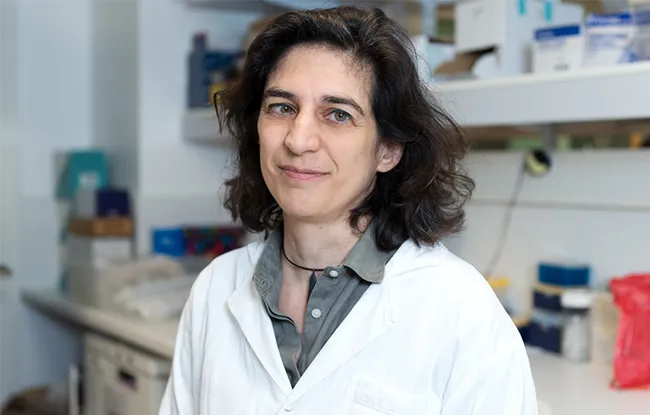- Home >
- Institut Curie News >
- Identification of a substance that acts on the release of extracellular vesicles and may have pro-tumor effects
At Institut Curie, Clotilde Théry’s “Extracellular vesicles, immune responses and cancer” team (Unit Immunity and Cancer, Institut Curie/Inserm) studies extracellular vesicles, small information‐bearing vesicles that enable cells, including cancerous cells, to communicate with other neighboring cells. These vesicles can either make tumors more aggressive or the opposite: slow their growth by alerting the immune system.
Using Institut Curie’s high-throughput BioPhenics screening facility, Clotilde Théry’s team studied over 1,200 drugs prescribed to patients (all pathologies) and their effect on (a) the number and kind of vesicles secreted by a breast tumor, and (b) the viability of said tumor. Among these, the researchers identified one drug in particular – homosalate [1] – that can greatly increase the secretion and modify the composition of extracellular vesicles. These vesicles then become able to protect other cells against stress induced by losing their attachment to their substrate. This stress normally results in either the slowing down or stopping of cellular growth.
The research consisted of removing tumor cells from their solid substrate in the presence of extracellular vesicles obtained from cells that had either been exposed to homosalate or had not. The researchers were able to show that once the cells were returned to their substrate, the ones that had been exposed to extracellular vesicles produced in the presence of homosalate recovered better from the stress.
This means that extracellular vesicles secreted by a cancer cell that has been exposed to homosalate could protect cells in the tumor environment against such stress, thereby making the development of tumors more likely. The results indicate that homosalate should be avoided if cancer is suspected.
Published in the Journal of Extracellular Vesicles, suggest that homosalate should be avoided if cancer is suspected.
This study, which was co-directed by Clotilde Théry and Lorena Martin-Jaular, made use of the expertise of several Institut Curie facilities: Imaging, Extracellular Vesicles, and Genomics
|
Publication: Homosalate boosts the release of tumour-derived extracellular vesicles with protection against anchorage-loss property. Eleonora Grisard, Nathalie Névo, Aurianne Lescure, Sebastian Doll, Maxime Corbé, Mabel Jouve, Gregory Lavieu, Alain Joliot, Elaine del Nery, Lorena Martin-Jaular*, Clotilde Théry* (2022). |
[1] Homosalate is an organic compound used as an ultraviolet filter in certain sunscreens.



